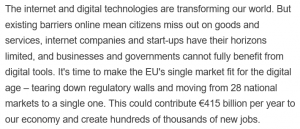EU Competition Law - The only fair is laissez-faire

2017 saw distribution models under scrutiny.
Is 2018 ripe for political intervention (Brexit or no Brexit)?
EU authorities rightly focus on hard core restrictions in public interest areas and have come a long way to dealing with innovative companies - but is it time to take a step back and look at the bigger picture?
Should EU governments (from a competition law angle) focus on matters of public interest (utilities, waste disposal etc.) and leave commerce to market forces - akin to American Laissez Faire Constitutionalism OR should authorities prescribe manufacturer’s Go-To-Market strategy to give customers access to products and protect customers from paying artificially high prices on goods and services that are not necessary for human survival!
A. 2017 saw a few anomalies in the approach by courts and competition authorities in EU:
Content
- Competition law requires free movement of goods, services and people across borders
- Yet ‘Content’ (Netflix etc.) can, arbitrarily, be accessed only temporarily abroad – for political reasons!
Platform restrictions
- ‘Luxury’ goods can hide behind a perceived ‘aura’! of luxury to stop its distributors from selling on platforms, like Amazon (ECJ’s ruling in Coty (Dec 2017) – limiting access for end customers.
- Silver lining: Manufacturers thereby restrict their own ability to expand via such mass market platforms + non-luxury goods will have to invent specific (not generic bans) qualitative criteria.
Spare Parts
- Car manufacturers have to allow spare parts to be sold on the open market (public need);
- Watch makers can limit repairer’s access to spare parts!
B. 2018 – Aftermath of the 2017 sector inquiry
Whilst some may deem the sector inquiry an open ticket to investigations (and there have been some) it was a welcome move. Possible improvements in the pipeline:
- Statutory Hierachy – Brexit aside (which may put a spanner in the works for cross border trade to/from the UK) clarity should be given on the extent to which conflict with tax and copyright laws are overridden by competition law.
- Content might move from a temporary political stance to permanent content access across the EU. Modernisation of copyright rules to follow.
- Selective Distribution – further clarity (albeit uncertainty is a lawyers friend!) of what qualifies for selective distribution and to what extent platform bans are permitted would be welcomed. More companies will consider whether to move away from selective distribution or strengthen their qualitative requirements (e.g. Nike).
- Geo-Blocking – Vendor Unilateral Programs, Manufacturers would be advised to review their unilateral programs (which typically sit outside of their distribution contracts) for any indirect restrictive practises such as country specific rebates. Non-dominant companies would continue to have some leeway in relation to non-cross border impacting rebate rules.
C. 2018 – Competition law – the year of positive business enablement
It would be a sad realisation if EU innovation is stifled in favour of a protectionist culture, thus 2018 will likely see more focus on allowing innovation whilst aiming for less customer harm and access for all.
Source: European Commission Website – December 2017
Political view
Cynical speculation that deep pockets and replenishing public funding may be at play is not warranted in situations where real end customer harm can be avoided via a political call to for example require Google to police content on its platform.
Similarly, does Uber, AirBnB, Amazon etc. simply offer a platform for individuals to advertise space for rent/services/products OR is it as easy to argue that ‘end customer harm’ is the real reason for example Uber (UK), is deemed a transport company (requiring licensing) and the taxi drivers are deemed ‘employees’ (employment law)?
Innovation is to be welcomed and not stiffled
- “Old money” (CocaCola, Lego, Unilever, Tesco, Rolls Royce, Lewis, etc.), grew into household names over decades, operate successfully alongside “New money” (Uber, Amazon, Aliebaba etc.) who became household ‘necessities’ overnight.
- Competition Lawyers are now discussing ‘humans’ –v- ‘computers programmes’ (Amazon / Airline Tariff Publishing) and algorithmic cartels. (KNects annual Advanced Competition Law Conference in Brussels (Nov’17)
- Speed is paramount. You can’t help sympathise with companies like Booking.com or even Google, where court cases are drawn out over years during which time uncertainty persists and market shares may dwindle.
Leaving aside an element of delaying tactics adopted by companies, which for fast paced innovative companies could mean the difference between insolvency and survival. - Competition authorities recognise that they will themselves need to become more innovative, to productively deal with welcome fast paced and volatile companies – for example they have started hiring economists with specialism in algorithms and their website now openly supports innovation – although in reality it remains a challenge.
I suspect 2018 could see the adoption of a more laissez faire approach in situations where end customer harm is questionable.
Here is to 2018 - the year EU competition law promotes innovation whilst aiming to minimise customer harm & promote access for all.
Eva Krogh - EMEA Counsel @ Veritas Technologies Limited

